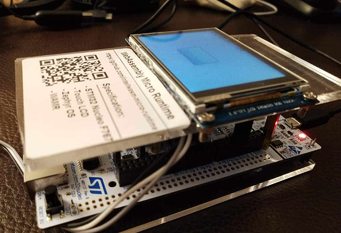| core | ||
| doc | ||
| samples | ||
| test-tools | ||
| .gitignore | ||
| CONTRIBUTING.md | ||
| Dockerfile | ||
| LICENSE | ||
| README.md | ||
WebAssembly Micro Runtime
WebAssembly Micro Runtime (WAMR) is a standalone WebAssembly (WASM) runtime with small footprint. It includes a few parts as below:
- A WebAssembly VM core (namely iwasm)
- The supporting API's for the WASM applications
- A mechanism for dynamic management of the WASM application
Current Features of WAMR
- WASM interpreter (AOT is planned)
- Supports for a subset of Libc.
- Supports "SIDE_MODULE=1" EMCC compilation option
- Provides embedding C API
- Provides a mechanism for exporting native API's to WASM applications
- Supports the programming of firmware apps in a large range of languages (C/C++/Java/Rust/Go/TypeScript etc.)
- App sandbox execution environment on embedded OS
- The purely asynchronized programming model
- Menu configuration for easy platform integration
- Supports micro-service and pub-sub event inter-app communication models
- Easy to extend to support remote FW application management from host or cloud
Application framework architecture
By using the iwasm VM core, we are flexible to build different application frameworks for the specific domains.
The WAMR has offered a comprehensive application framework for device and IoT usages. The framework solves many common requirements for building a real project:
- Modular design for more language runtimes support
- Inter application communication
- Remote application management
- WASM APP programming model and API extension mechanism

Build WAMR Core and run WASM applications
WAMR VM core (iwasm) can support building on different platforms:
- Linux
- Zephyr
- Mac
- VxWorks
- AliOS-Things
- Docker
- Intel Software Guard Extention (SGX)
After building the iwasm, we can compile some basic WASM applications and run it from the WAMR core. As the WAMR core doesn't include the extended application library, your WASM applications can only use the WAMR built-in APIs.
See the doc/building.md for the detailed instructions.
Embed WAMR
WAMR can be built into a standalone executable which takes the WASM application file name as input, and then executes it. In some other situations, the WAMR source code is embedded the product code and built into the final product.
WAMR provides a set of C API for loading the WASM module, instantiating the module and invoking a WASM function from a native call.
See the doc/embed_wamr.md for the details.
WAMR application programming library
WAMR defined event driven programming model:
- Single thread per WASM app instance
- App must implement system callbacks: on_init, on_destrory
In general there are a few API classes for the WASM application programming:
- WAMR Built-in API: WAMR core provides a minimal libc API set for WASM APP
- WAMR application libraries:
- Timer
- Micro service (Request/Response)
- Pub/Sub
- Sensor
- Connection and data transmission
- 2D graphic UI (based on littlevgl)
- User extended native API: extend the native API to the WASM applications
- 3rd party libraries: Programmers can download any 3rd party C/C++ source code and build it together with the WASM APP code
See the doc/wamr_api.md for the details.
Samples and demos
The WAMR samples are located in folder ./samples. A sample usually contains the WAMR runtime build, WASM applications and test tools. The WARM provides following samples:
- Simple: The runtime is integrated with most of the WAMR APP libaries and multiple WASM applications are provided for using different WASM API set.
- littlevgl: Demostrating the graphic user interface application usage on WAMR. The whole LittlevGL 2D user graphic library and the UI application is built into WASM application.
- gui: Moved the LittlevGL library into the runtime and defined a WASM application interface by wrapping the littlevgl API.
- IoT-APP-Store-Demo: A web site for demostrating a WASM APP store usage where we can remotely install and uninstall WASM application on remote devices.
The graphic user interface demo photo:
Releases and acknowledgments
WAMR is a community efforts. Since Intel Corp contributed the first release of this open source project, this project has received many good contributions from the community.
See the major features releasing history and contributor names
Roadmap
See the roadmap to understand what major features are planed or under development.
Please submit issues for any new feature request, or your plan for contributing new features.
Submit issues and contact the maintainers
Click here to submit. Your feedback is always welcome!
Contact the maintainers: imrt-public@intel.com
